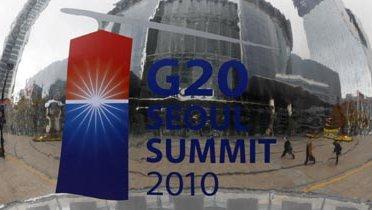On November 11-12, G-20 leaders meet in Seoul with Korea as the host—the first time that an emerging or newly industrialized country chairs the meeting. Opinion on what the G-20 has achieved since it started to meet at leaders’ level two years ago is divided. Many focus on the actual summit meetings and on the fact that it has been hard to achieve concrete agreement on key policy issues. No doubt the G-20 is also threatened by the syndrome of grand declarations with weak follow up that we already observed during G7 meetings in the past.
It is important to realize, however, that the G-20 summits have given rise to an elaborate process of preparation, which has led to an unprecedented degree of interaction between policymakers and key civil servants that now involves officials from the large emerging market economies. It is too early to fully evaluate the results of the G-20 finance ministers meeting of October 22-23, but the agreement reached on current account target zones and reform of IMF governance may turn out to be a key step forward in global economic cooperation. For observers of the G7 in the past, one of the valuable side products of the process had been a degree of familiarity fed by frequent brainstorming between key officials that progressively led to greater cohesion and facilitated decision-making, particularly at a time of crisis. Such interaction is now taking place between a much wider group of countries that is much more representative of our 21st century world.
In today’s world, however, official consultations are not enough. They need to be complemented, fed and supported by discussions among civil society actors, academics and business leaders who can break out of official constraints in the ideas that are tabled and in the approaches taken. At the Global Economy and Development program at the Brookings Institution, we invited a group of friends and colleagues active in think tanks and universities in G-20 countries, and/or actively working on G-20 related issues, to contribute short think pieces at the occasion of the Seoul 2010 Summit. In order to give some focus to these contributions, we encouraged the contributors to relate their comments at least broadly to the development dimension that the Korean hosts have included in the agenda of the summit and to the link between development and key global policy issues.
We have fittingly named the collection of contributions the “Think Tank 20” (TT-20). And while we initiated the process at Bookings, it is a fully cooperative enterprise and we hope that other think tanks and research groups will post the contributions and disseminate them as much as we hope to do. We also hope that this is just the first step in an ongoing effort to accompany the official G-20 process by a network of informal opinion leaders who work independently but in cooperation with each other and whose regular interactions will allow both an increasingly deeper analysis of the issues and innovative ideas that can add to the debate and be helpful to the global cooperative process.
Download the full report » (PDF)
Introduction to the Think Tank 20 » (PDF)
Kemal Derviş
Vice President and Director, Global Economy and Development, Brookings Institution
ARGENTINA
Currency Appreciations Come in Different Shapes and Sizes » (PDF)
Miguel Kiguel
Former Undersecretary of Finance and Chief Advisor to the Minister of the Economy, Argentina
AUSTRALIA
Opportunity for Asia and the G-20 » (PDF)
Peter Drysdale
Head of the East Asian Bureau of Economic Research and Co-Editor of the East Asia Forum
Soogil Young
President, Korea National Strategy Institute
BRAZIL
The G-20 and Development: Three Trying Triads » (PDF)
Pedro Malan
Former Brazilian Minister of Finance
CANADA
The G-20: Development and the Role of Developing Countries » (PDF)
Manmohan Agarwal
Senior Visiting Fellow, Center for International Governance Innovation
John Whalley
Distinguished Fellow, Center for International Governance Innovation
CHINA
Making Big Deals to Help the World » (PDF)
Qiao Yu
Professor, School of Public Policy and Management, Tsinghua University
FRANCE/EUROPEAN UNION
The G-20 and the Currency War » (PDF)
Jean Pisani-Ferry
Member of the French Prime Minister’s Council of Economic Analysis; Director, Bruegel
FRANCE
The G-20 Seizure of Development: Inspiration, Vision and Action » (PDF)
Jacques Mistral
Head of Economic Research, Institut français des relations internationales
GERMANY
The G-20 and Global Development: Which Road to Take? » (PDF)
Thomas Fues
Director, Development Policy Perspectives on Global Governance, German Development Institute
Peter Wolff
Head, World Economy and Development Financing, German Development Institute
INDIA
IMF Reforms Bode Well for the G-20 Seoul Summit, But More Tangible Gains Are Needed » (PDF)
Rajiv Kumar
Director General, Federation of Indian Chambers of Commerce and Industry
INDONESIA
Lessening Pressure on Trade Protectionism by Diversifying Exports » (PDF)
Muhammad Chatib Basri
Director, Institute for Economic and Social Research, University of Indonesia
ITALY
The G-20 and Two Scenarios for the World Economy » (PDF)
Paolo Guerrieri
Professor of Economics, University of Rome Sapienza
JAPAN
A Development Agenda for the Seoul 2010 G-20 » (PDF)
Shinji Asanumara
Visiting Professor, Asian Public Policy Program, School of International and Public Policy, Hitotsubashi University
KOREA
The G-20 Calls a Truce in the Currency War » (PDF)
Wonhyuk Lim
Fellow, Korea Development Institute
RUSSIA
G-20 Priorities: Heavily Indebted Rich Countries » (PDF)
Sergei Guriev
Rector, New Economic School, Moscow
Saudi Arabia
Addressing Development at the Seoul G-20 Summit » (PDF)
Abdullah Ibraim El-Kuwaiz
Former Saudi Arabian Ambassador to the Kingdom of Bahrain
TURKEY
Challenges to Development in Our Globalizing World » (PDF)
Izak Atiyas
Professor, Sabanci University
Kamil Yilmaz
Professor, Koç University
E. Fuat Keyman
Professor and Director, Istanbul Policy Center, Sabanci University
UNITED KINDGOM/ EUROPEAN UNION
Currency Wars and the Emerging Market Countries » (PDF)
Richard Portes
President, Center for Economic Policy Research
UNITED STATES
Development in the G-20: Common Ground? » (PDF)
Homi Kharas
Senior Fellow and Deputy Director, Global Economy and Development, Brookings Institution



